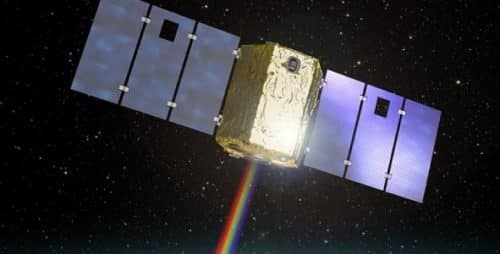This is what the director of the space plant at TEA Ofer Doron says in an interview conducted before the double launch: "Fingers are crossed for a successful launch of Venus and Offset 3000"

"Venus" - the first Israeli satellite for the purposes of environmental research and the observation satellite Offset 3000 - also made in Israel will be launched this morning, August 2, 2017 at 04:58, on a "Vega" launcher from French Guinea. (This page will be updated following the launch)
The assembly of the two satellites and the production of parts of them were carried out at the Mabat Space plant of the aerospace industry. Ofer Doron, the director general of the Mabat Halal plant in the aerospace industry, said in an interview with the Hedaan website ahead of the launch that this is a huge Israeli technological achievement. "We are crossing our fingers that the launch will be successful. This is a complex project because it requires parallel operation from two separate control rooms.
"Venus is an interesting satellite from a scientific point of view, both small and light and quick and nimble with a unique ability to photograph with good resolution in relatively large areas. The camera developed by Alup is able to take pictures in 12 colors and what is added to them is the ability to return to any place once every two days at the same angle, this is derived from its special route and impressively it was in excess demand until the French Space Agency had to choose which areas from among those proposed to be photographed.
The second technological mission of Venus is the electric propulsion system, which is its first mission. After we succeed here, it will be possible to fly it in other missions and contribute to improving the performance of observation satellites.:
What is beautiful here - there is really work here by the entire Israeli space system: the aerospace industry, Rafael and Aluf, each in part, with groundbreaking activity. Finally there is a serious international project led by the Israel Space Agency in the field of civil space missions. If we want the industry to grow stronger, we must have groundbreaking projects - and we need to build more multi-industrial satellites in multi-year projects if we want to preserve Israel's space capability."

Next in line is the Shalom satellite, which I hope the government will approve its budget for. There are already agreements from the Italians who are partners in the project. In general, international cooperation in space is a good thing. Venus is an example of cooperation with the French Space Agency at all levels - both in terms of the organizations, as well as the relationship between the scientists and the technological community. And not only in the space industry - such a project connects many communities on the periphery of the space field in the world.
Offset is less talked about because it is a military satellite, the client of the satellite has no interest in advertising its capabilities. Unlike the space agencies who have an interest in boasting about their capabilities. It can only be said as a tool that it is an extremely high-quality observation satellite, allows high-resolution photography and gives amazing image quality, and everything that is needed for a military observation satellite. The only things that compare to its capabilities in the world or exceed them are the American and French civilian monsters, and even here we are talking about satellites that are still in development and have not yet been launched, even when will be launched, their price will be significantly higher.
It should be noted that the fact that Italy chose to buy the satellite in Israel is impressive. Italy was the third country in the world to launch satellites and its space budget reaches 600 million euros per year, this is an order of magnitude larger than Israel, but they cannot develop such a satellite with these qualities. Not that they can't seat people with a huge fortune and ten years, but still - a huge fortune and ten years. It is a great honor for the Israeli industry, a vision of everyone involved in this, both on the industrial and governmental side. There is a lot of interest in these satellites in the world because of their excellent capabilities, now there is only one thing left to launch it and put it into service."
See more on the subject on the science website:
- Interview with the chief scientist of the "Venus" satellite project
- The Israeli satellites Venus and Offset 3000 will be launched next week from French Guinea
- The "Venus" environmental research satellite leaves Israel on its way to launch. Minister Aconis: "Looking forward to more opportunities for cooperation with France"
- The head of the French Space Agency at the ceremony of handing over the Venus satellite for launch: "Space missions are of great importance in the fight against global warming"
- Precision agriculture, from space
To watch the launch bA site dedicated to the Venus satellite
